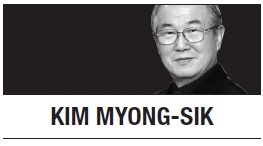[Kim Myong-sik] Please do not make haste, Mr. President
By Kim Myong-sikPublished : Aug. 2, 2017 - 17:46
 Thousands of workers are on forced vacation since the construction of two nuclear reactors at the Shin Kori site stopped late in June. They must feel deeply frustrated because the fates of what would be Korea’s 26th and 27th reactors, and their own, are being put on trial by a “citizens’ jury,” a novel process proposed by the Moon Jae-in administration.
Thousands of workers are on forced vacation since the construction of two nuclear reactors at the Shin Kori site stopped late in June. They must feel deeply frustrated because the fates of what would be Korea’s 26th and 27th reactors, and their own, are being put on trial by a “citizens’ jury,” a novel process proposed by the Moon Jae-in administration. This particular body of unique power has no statutory basis yet and no manual has been made of its operation, except that it will consist of 350 people to be selected completely at random from all walks of life across the country. And it is given a rather short life span, ending Oct. 21, which the government believes is long enough to decide the course of the nation’s nuclear energy industry.
An ad hoc presidential commission was created early last month with the task of assembling the citizens’ jury and helping it make a decision on what to do with the twin reactor project suspended at a progress rate of 28 percent. The nine-member Public Deliberation Commission chaired by a former Supreme Court justice includes no nuclear technology or energy industry expert. Officials said this was to preclude doubts about its neutrality regarding this sensitive national issue.
Curiosity led me to searching online to find any similar foreign models applied to problems in the area of nuclear energy. It was thanks to the figure 350 that I was able to spot the Nuclear Fuel Cycle Citizens’ Jury of South Australia, also a 350-member body that deliberated on the state government’s plan to build an international nuclear waste storage facility last year.
The identical sizes of South Australian citizens’ jury and our soon-to-appear people’s assemblage and some other resemblances between the two raised the possibility that whoever is in charge of the nuclear power issue in the Moon administration might have copied the Australian state’s public participation practice. The Public Deliberation Commission here will serve as the midwife and guide of the contemplated citizens’ jury, just as the newDemocracy Foundation of Australia did there.
To form the first citizens’ jury of 50 men and women, 25,000 people at addresses randomly chosen from Australia Post’s database were invited to join. Among them 1,125 respondents indicated interest in joining the jury and 50 were finally picked to represent age, gender, education and geographical location as evenly as possible. For four days over two weekends, they gathered in Adelaide and reviewed a hefty report by the Nuclear Fuel Cycle Royal Commission of Australia with the help of experts.
Similarly, six more citizens’ juries were formed from other parts of the state. South Australia Premier Jay Weatherill attended each jury’s opening session to stress that the state government was open to any conclusion by the citizens’ jury. He told the jurors that the purpose of the unusual method was to remove the influences of politicians, self-interest groups and advocate groups from the decision-making process.
The outcome of the assiduous procedure, however, was disappointing. Seventy percent of the 350 jurors rejected the idea of building a nuclear waste dump for domestic and international clients largely due to safety problems and costs. The final report revealed that they deliberated on the issue under the principles of “legitimacy, inclusivity, transparency, accountability and consideration of the future.”
Observing the South Australian case, I thought that the key was trust between the government and the governed. When the Blue House announced the plan to settle the issue through the involvement of the Public Deliberation Commission and the citizens’ jury, critical media and opposition parties reacted instantly with suspicion that the president, being already determined to carry out his campaign pledge of exiting from nuclear energy, was trying to pass the buck to “citizens.”
Confusion grew when members of the deliberation panel expressed premature concerns about being held responsible for any decision in lieu of the government. As opposition groups demand the question be referred entirely to the National Assembly, there is fear that any conclusion will face claims of government manipulation in the course of public debate.
I believe that President Moon chose the citizens’ jury format because he thought it was more democratic than the usual political battle in the Assembly. Then, it will be good if he shows that he can change his mind by listening to what the people say. Before the South Australian citizens’ jury, Premier Weatherill acted like a counsel in a court and patiently entertained their questions. If our government modeled the process after the Australian state’s practice, it might as well follow its slower but scrupulous manner. Our president just needs not to make haste on this matter.
By Kim Myong-sik
Kim Myong-sik is a former editorial writer for The Korea Herald. He can be reached at kmyonsik@hanmail.net -- Ed.







![[Graphic News] More Koreans say they plan long-distance trips this year](http://res.heraldm.com/phpwas/restmb_idxmake.php?idx=644&simg=/content/image/2024/04/17/20240417050828_0.gif&u=)
![[KH Explains] Hyundai's full hybrid edge to pay off amid slow transition to pure EVs](http://res.heraldm.com/phpwas/restmb_idxmake.php?idx=644&simg=/content/image/2024/04/18/20240418050645_0.jpg&u=20240419100350)





![[From the Scene] Monks, Buddhists hail return of remains of Buddhas](http://res.heraldm.com/phpwas/restmb_idxmake.php?idx=652&simg=/content/image/2024/04/19/20240419050617_0.jpg&u=20240419175937)

![[KH Explains] Hyundai's full hybrid edge to pay off amid slow transition to pure EVs](http://res.heraldm.com/phpwas/restmb_idxmake.php?idx=652&simg=/content/image/2024/04/18/20240418050645_0.jpg&u=20240419100350)

![[Today’s K-pop] Illit drops debut single remix](http://res.heraldm.com/phpwas/restmb_idxmake.php?idx=642&simg=/content/image/2024/04/19/20240419050612_0.jpg&u=)